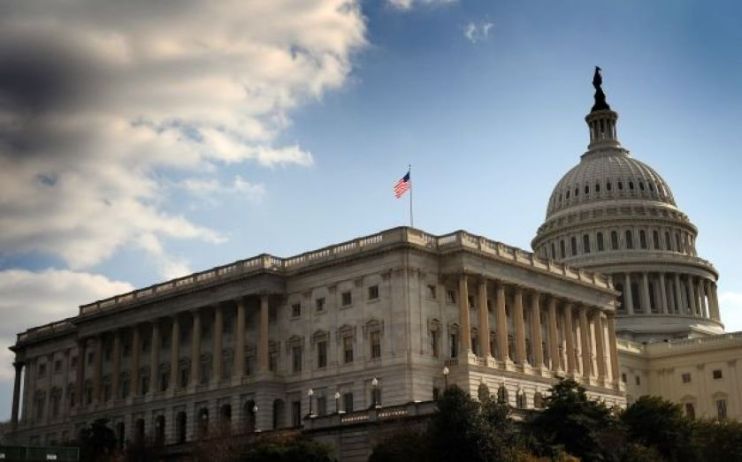US Senate avoids shutdown with green light on £952bn spending tranche

The US senate passed a $1.2 trillion (£952bn) package of spending bills in the early hours of Saturday morning, pushing any threat of a government shutdown back to the autumn.
The bill now goes to President Joe Biden to be signed into law.
The vote – 74-24 – came after funding had expired for the agencies at midnight, but the White House sent out a notice shortly after the deadline announcing the Office of Management and Budget had ceased shutdown preparations because there was a high degree of confidence that US congress would pass the legislation and the President would sign it on Saturday.
The statement said: “Because obligations of federal funds are incurred and tracked on a daily basis, agencies will not shut down and may continue their normal operations.”
Prospects for a short-term government shutdown had appeared to grow Friday evening after Republicans and Democrats battled over proposed amendments to the bill.
Any successful amendments to the bill from the Senate would have sent the legislation back to the house of representatives, which had already broken up for a two-week recess.
But shortly before midnight, senate majority leader Chuck Schumer announced a breakthrough.
Mr Schumer said: “It’s been a very long and difficult day, but we have just reached an agreement to complete the job of funding the government.
“It is good for the country that we have reached this bipartisan deal. It wasn’t easy, but tonight our persistence has been worth it.”
While US congress has already approved money for veterans affairs, interior, agriculture and other agencies, the bill approved this week is much larger, providing funding for the defence, homeland security and state departments and other aspects of general government.
The Senate passed the bill on Friday morning by a vote of 286-134, narrowly gaining the two-thirds majority needed for approval. More than 70 per cent of the money would go to defence.
The vote tally in the house reflected anger among Republicans over the content of the package and the speed with which it was brought to a vote.
House speaker Mike Johnson brought the measure to the floor even though a majority of Republicans ended up voting against it. He said afterward that the bill “represents the best achievable outcome in a divided government”.
In sign of the conservative frustration, Republican representative Marjorie Taylor Greene initiated an effort to oust Mr Johnson as the house began the vote, but held off on further action until the house returns in two weeks. It is the same tool that was used last year to remove the last Republican speaker, Kevin McCarthy of California.
The vote breakdown showed 101 Republicans voting for the bill and 112 voting against it. Meanwhile, 185 Democrats voted for the bill and 22 against.
Kay Granger, the Republican chair of the House Appropriations Committee that helped draft the package, stepped down from that role after the vote. She said she would stay on the committee to provide advice and lead as a teacher for colleagues when needed.
Mr Johnson broke up this fiscal year’s spending bills into two parts as House Republicans revolted against what has become an annual practice of asking them to vote for one massive, complex bill called an omnibus with little time to review it or face a shutdown.
He viewed that as a breakthrough, saying the two-part process was “an important step in breaking the omnibus muscle memory”.
Still, the latest package was clearly unpopular with most Republicans, who viewed it as containing too few of their policy priorities and as spending too much.
“The bottom line is that this is a complete and utter surrender,” said Eric Burlison.
It took legislators six months into the current fiscal year to get near the finish line on government funding, the process slowed by conservatives who pushed for more policy mandates and steeper spending cuts than a Democratic-led senate or White House would consider. The impasse required several short-term, stop-gap spending bills to keep agencies funded.
The first package of full-year spending bills, which funded the departments of veterans affairs, agriculture and the interior, among others, cleared congress two weeks ago with just hours to spare before funding expired for those agencies.
When combining the two packages, discretionary spending for the budget year will come to about $1.66 trillion (£1.31bn). That does not include programmes such as Social Security and Medicare, or financing the country’s rising debt.
To win over support from Republicans, Mr Johnson touted some of the spending increases secured for about 8,000 more detention beds for migrants awaiting their immigration proceedings or removal from the country.
That is about a 24 per cent increase from current levels. Also, Republican leadership highlighted more money to hire about 2,000 Border Patrol agents.
Democrats, meanwhile, are boasting of a one billion dollar (£792 million) increase for Head Start programs and new child care centres for military families.
They also played up a $120 million increase in funding for cancer research and a $100m (£79.2m) increase for research into Alzheimer’s.
